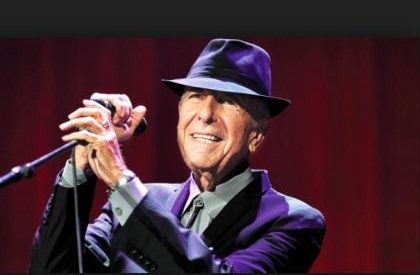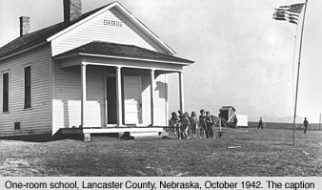Physicist and poet Dr, Jacob Bronoswki once asked ?What goes on in the mind when we imagine??
To a large degree Daniel Khaneman, answers Bronowski?s question when he writes, in his best selling book, ?Thinking, Fast and Slow?,
?The world in our heads is not a precise replica of reality; our expectations about the frequency of events are distorted by the prevalence and emotional intensity of the messages to which we are exposed.?
Dr. Bronowski went on to conclude that ?imagination is a specifically human gift?. He describes the experiments of Walter Hunter in which Hunter taught a group of dogs that when a light came on over one of ab arrangement of tunnels they would be rewarded with food. However, when Hunter added the dimension of time and made the dogs wait until after the light went out. The dogs forgot which tunnel had the light within a matter of seconds. The results of Hunter?s experiment demonstrated an animal cannot recall a signal from the past for even a short fraction of the time that a human being can. Animals do not depend, as human memory does, on the calling to mind of absent things.
According to Dr. Brnonowski, ?to imagine? is to make images and to move them about in one?s head in new arrangements. Following is a painting by Suling Wang, an internationally recognized painter, which she calls ?Cryptic Butterfly?, inspired by Taiwanese oral tradition. Ms. Wang?s work is composed of meticulously created layers of painted calligraphy and cartoon-like forms overlaid atop other shapes that suggest trees, stems, and mountains all imagined and felt by the artist
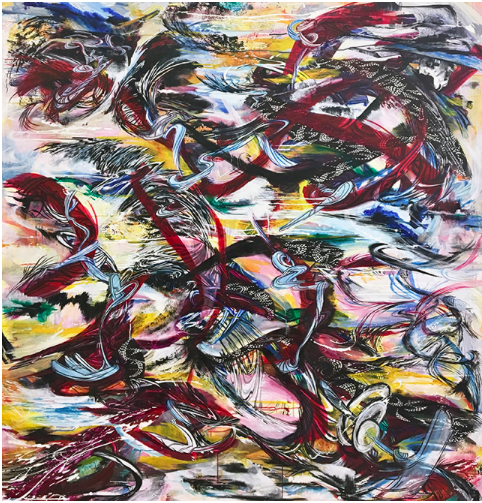 https://www.guggenheim.org/artwork/15336
https://www.guggenheim.org/artwork/15336
Human beings, unlike other animals, fix memories in images or other substitute symbols. With a symbolic vocabulary we spell out the future and not just one but many futures which we can weigh one against the other.
The most important symbols for humans are words, which are abstract symbols other animals do not have. Dr. Bronowski writes ?of all the distinctions between man and animal, the characteristic gift which makes us human is the power to work with symbolic images; the gift of imagination.? Both poetry, literature that uses aesthetic and rhythmic qualities of language, and songs, just poetry set to music, are examples of man?s gift of imagination and there may be no more powerful example of man?s gift of imagination and the use of words than W.B.Yeats? poem, ?The Second Coming?.
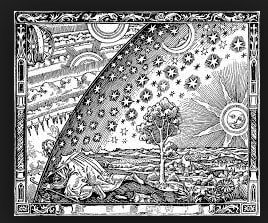
?Turning and turning in the widening gyre
The falcon cannot hear the falconer;
Things fall apart; the centre cannot hold;
Mere anarchy is loosed upon the world,
The blood-dimmed tide is loosed, and everywhere
The ceremony of innocence is drowned;
The best lack all conviction, while the worst
Are full of passionate intensity.
Surely some revelation is at hand;
Surely the Second Coming is at hand.
The Second Coming! Hardly are those words out
When a vast image out of Spiritus Mundi
Troubles my sight: somewhere in sands of the desert
A shape with lion body and the head of a man,
A gaze blank and pitiless as the sun,
Is moving its slow thighs, while all about it
Reel shadows of the indignant desert birds.
The darkness drops again; but now I know
That twenty centuries of stony sleep
Were vexed to nightmare by a rocking cradle,
And what rough beast, its hour come round at last,
Slouches towards Bethlehem to be born??
According to Yeats ?Spiritus Mundi?, a Latin term that literally means, ?world spirit?, is ?a universal memory and a ?muse? of sorts that provides inspiration to the poet or writer?. Yeats used the term to describe the collective soul of the universe containing the memories of all time. From ?Spiritus Mundi,? Yeats believed, came all poets? inspiration.
To Yeats, Spiritus Mundi is the source of all ?images? and ?symbols,? a ?collective unconscious.? Dr. Bronowski?s believed ?the characteristic act of the mind of man is ?to imagine? which means that Spiritus Mundi is not just available to poets but to all human beings. We can all find comfort in a ?collective unconscious? or source of all ?images? and ?symbols.
While Khaneman found ?our expectations about the frequency of events are distorted by the prevalence and emotional intensity of the messages to which we are exposed? he would likely add ?the emotional intensity of messages to which we are exposed? includes the emotions of both the sender and receiver of ?the messages? as described in Claude Shannon?s famous Information Model pictured here.
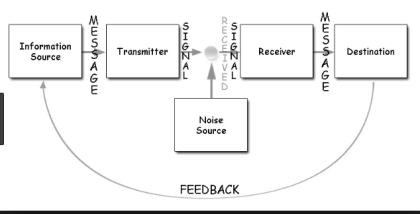
Furthermore, none of this is to say that the sender and receiver cannot be one and the same person, as when we send messages to ourselves with our feelings, recalled from the amygdala of our brain as thoughts described by Dr. Antonio Damasio.
In Descartes? Error Dr. Damsio presents his ?somatic marker hypothesis?, a proposed mechanism by which emotions guide (or bias) behavior and decision-making, and explains how rationality requires emotional input. When making subsequent decisions, these somatic markers and their evoked emotions are consciously or unconsciously associated with their past outcomes, and influence decision-making in favor of some behaviors instead of others.
Dr. Damasio argues that Ren Descartes? ?error? was the dualist separation of mind and body, rationality and emotion. According to Dr. Damasio ?Somatic markers? are feelings in the body that are associated with emotions, such as the association of rapid heartbeat with anxiety or of nausea with disgust. According to the hypothesis, somatic markers strongly influence subsequent decision-making. Within the brain, somatic markers are thought to be processed in the ventromedial prefrontal cortex (VMPFC) and the amygdala. The hypothesis has been tested in experiments using the Iowa gambling task.
According to Dr. Damasio, joy or sorrow can emerge only after the brain registers physical changes in the body. The mind is not separate from the body but rather is an integral part of the biological entity we call a human being. This is why we need to be on guard of the environment (mental as well as physical) into which we go or are sometimes taken.
Perhaps nothing ?registers ?more? physical change in the body? than real rock ?n? roll, registered through the human auditory system and there?s no more real rock n roll than Led Zppelin?s ?Stairway to Heaven?.
?There?s a lady who?s sure
All that glitters is gold
And she?s buying a stairway to heaven
When she gets there she knows
If the stores are all closed
With a word she can get what she came for?
This is how one reviewer described it.
?Led Zeppelin?s riff-tastic anthem ?Stairway to Heaven,?isn?t just a great rock song; it?s the great rock song!
The centerpiece of Zeppelin?s 1971 untitled fourth album, (?Zoso? or ?Led Zeppelin IV,? ), ?Stairway? set the blueprint for all multi-suite hard-rock epics to follow, though none have come even remotely close to matching its greatness. Even on the 12,000th listen, the track?s ethereal magic never wears thin, and that timeless build from Jimmy Page?s shimmering, fingerpicked guitar intro to the riff-driven full-band attack is one of the most visceral moments in the history of recorded music.?
Poetry, which is nothing more than music without the sound, can be equally evocative in terms of it?s bodily effect. Examples of physical change in the body? evoked with poetry is the work of poet/song writer Leonard Cohen, who Nobel Laureate Bob Dylan, perhaps the greatest poet/song writer, called ?his nearest rival?. That should be understandable when listening to Cohen?s ?So Long Marianne?.
?For six decades, Leonard Cohen revealed his soul to the world through poetry and song ? his deep and timeless humanity touching our very core. Simply brilliant. His music and words will resonate forever.? ? Rock & Roll Hall of Fame, 2008
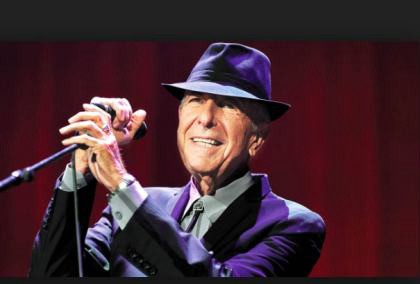
Visceral means ?relating to deep inward feelings rather than to the intellect?. So if ?the characteristic act of the mind of man is ?to imagine? and Spiritus Mundi is not just available to poets but to all human beings then we can all find comfort in a ?collective unconscious? or source of all ?images? and ?symbols, a source of a visceral collective unconscious that can bring all people together with poetry and music.
___________________________________________________________________
Notes:
- http://www.public.iastate.edu/~bccorey/105%20Folder/The%20Reach%20of%20Imagine.pdf
- https://en.wikipedia.org/wiki/Suling_Wang
- http://bigthink.com/videos/the-amygdala-in-5-minutes
- https://en.wikipedia.org/wiki/Descartes_Error
- Damasio, Antonio R.(2008) [1994]. Descartes? Error: Emotion, Reason and the Human Brain. Random House. (2008)
- https://www.scientificamerican.com/article/feeling-our-emotions/
- http://ultimateclassicrock.com/led-zeppelin-stairway-to-heaven/
- Leonard Cohen Has Died at Eighty-Two | The New Yorker
- Leonard Cohen Makes It Darker | The New Yorker
Originally published at neutec.wordpress.com on April 30, 2018.
